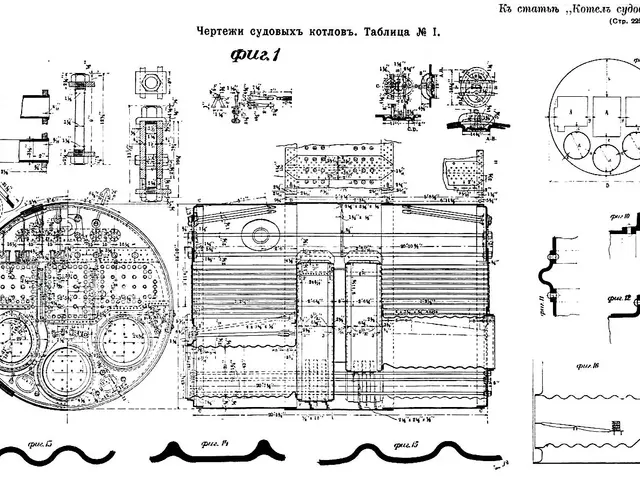Sliding Towards Authoritarianism: USA's Shaky Political Landscape
Slipping Towards Autocratic Rule in the U.S.: Assessing the Degree of Political Transformation
In a stark shift from its traditionally robust democratic image, the United States is currently undergoing a tumultuous period. Impressions and expert analyses are unanimous: the Land of the Free is no more. The US government under President Donald Trump seems to be actively sabotaging and undermining its own political system. It's a chilling transition from a beacon of democracy to a questionable political landscape.
Are we seeing the beginning of an autocracy? A multitude of political scientists and researchers seem to agree—a descent into autocracy appears imminent. But how far will it go?
It's a simple matter of asking: Has the US already become an autocracy? While the answer is complex, it can be evaluated based on certain criteria and through categorical assessments. Tracking every move made by the US government has become an overwhelming task, but the bludgeoning force unleashed in the initial months has started to slow, and some grand lines are gradually becoming clear.
Tearing at the Foundations
Under President Trump, a multitude of democratic system pillars have come under attack: separation of powers, checks and balances on the executive, equality before the law, freedom of speech, and a free press. The administration has even meddled in education, research, and culture, replacing anti-corruption controls and equal opportunity measures with claims of alleged racism against whites. Remarkably, the only definitive limit to Trump's power seems to be the decisions of the Supreme Court, which is already dominated by conservative judges.
In agencies, the government has been trying to dismantle checks and balances in schools and universities as well, manipulating institutional structures to serve their interests.
Quantifying the Crisis
Feeling uneasy about the blurred lines in US politics, more than 700 scientists have expressed their deep concerns in a routine survey on the state of the political system in the USA. According to this survey, the USA has dropped from 67 to 49 on the democracy scale after Trump's first 100 days in office—the lowest score since the survey began in 2017. The country is now closer to a dictatorship than neighboring Mexico but still further away than Hungary.
Graphing the Shift
On a scale from a perfect democracy (100) to a pure dictatorship (0), the USA is currently hovering in the danger zone of a competitive autocracy, a system where elections take place, but the incumbent misuses them to stay in power, much like Viktor Orbán in Hungary, Recep Tayyip Erdoğan in Turkey, or Nicolás Maduro in Venezuela.
The lurch towards autocracy can be seen as a result of multiple factors, including:
- Manipulation of state institutions
- Erosion of civil liberties and political rights
- Influence of money in politics
- Redistricting and electoral manipulation
- Polarization and erosion of political culture
- Replacement of independent officials
- Media and academic influence
Researchers use various indices, such as Freedom House's Freedom in the World Survey, The Economist Democracy Index, V-Dem Democracy Indices, and International IDEA's Democracy Scores, to quantify these trends and identify specific areas of concern.
A Cause for Concern
Historian Timothy Snyder argued, just over two weeks into Trump's presidency, that it was already a coup, highlighting the role of Elon Musk and his employees, who had gained access to US ministries and sensitive databases. Some measures imposed by the new US administration have been reversed or restricted by courts, but the changes already made are likely to persist throughout Trump's presidency. The question remains: What went undetected amid the databases and data tampering?
The resistance against these changes is mostly coming from the courts, but defending oneself against legal attacks can be costly in the US. With frivolous lawsuits, Trump's administration is able to break resistance and intimidate the opposition.
Trump has mostly issued decrees or instructed ministries to make changes, but these measures can also be reversed by any subsequent government with the required majorities. Nevertheless, some changes are likely to persist throughout Trump's term.
A Grim Outlook or a Rebound?
As the political landscape in the USA seems to be descending into chaos, some question whether the future is truly bleak. Impeachment trials, voter suppression, and electoral manipulation have marred the political system for years. However, Trump has raised the stakes, seeking to exercise a presidency without the constraints of Congress and the courts, irrationally disregarding the checks and balances the US Constitution intended to prevent.
Whether the USA will remain close to authoritarianism or move even further in that direction may depend on the goodwill of future heads of state. Will it be someone who respects the separation of powers, advocates for a free press, champions equal rights, and reveres education and research—or not? It's a question that hangs heavy in the air as America watches the unfolding drama on the world stage.
Source: ntv.de
- Donald Trump
- USA
[1] Levitsky, Steven and Ziblatt, Daniel. "How Democracies Die." (2018).[2] Diamond, Larry. "Ill Winds: Saving Democracy from Russian Rage, American Rapaciousness, and Islamist Terror." (2019).[3] Svolik, Milan. "The Populist Coalition: A New Kind of Dictatorship." (2019).[4] Zakaria, Fareed. "Ten Lessons for a Hint of Optimism." (2019).[5] Ginsburg, Robert and Melchor, Aldo. "The Endurance of Democracy: Lessons from History." (2014).
- The European Union, watching the shifts in the USA's political landscape, may find similarities with autocracies and question its own democratic stability.
- The auto-da-fe of democratic principles continues within the USA's political system under President Trump, with attacks on separation of powers, checks and balances, and freedom of speech.
- WhatsApp groups are buzzing with general news and concerns about the erosion of democracy, as the USA descends deeper into a system that resembles autocracy.
- Immigration policies, accused of being biased and discriminatory, are a contentious part of the political debate in the USA, reflecting the wider issue of civil liberties and human rights violations.
- The policy-and-legislation changes made by the USA's administration have sparked heated debates among politicians, with some agreeing on the need for reforms in immigration and foreign policy while others expressing concern over the effects on civil liberties and human rights.
- The potential risks of car-accidents, crime-and-justice, and fires in the USA could rise as the administration's emphasis on security and control overshadows protective regulations and safety measures.
- As the USA grapples with internal issues, it may face less attention and fewer resources to tackle global problems such as war-and-conflicts, thus potentially destabilizing international politics.








